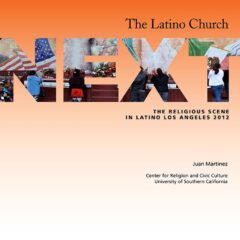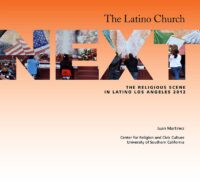Religiously oriented Latinos, Catholic and Protestant, tend to create tensions for the traditional political categories in Los Angeles and the U.S. On issues like abortion, same sex marriage or religious influence in politics, most Latinos, particularly evangelicals/ Pentecostals, identify with conservative positions. But when addressing issues like immigration, government guaranteed health insurance, or a willingness to pay higher taxes for broader government services, most Latinos identify with positions normally considered liberal. This tension was apparent in 2008 when most Latinos, including Pentecostals and evangelicals, voted both for President Obama and for Proposition 8, the California measure that defined marriage as being between a man and a woman. Spanish Catholics founded Los Angeles, and there have been Latino Protestants in the region since the 1880s, but Latino political influence has been relatively limited throughout the history of the city.
That did not begin to change significantly until the 1960s. On the religious front, a few Latino religious leaders, principally priests or mainline pastors, began to participate more actively in the political sphere in the late 1960s. A few Latino priests from Los Angeles became a part of PADRES (Padres Asociados para Derechos Religiosos, Educativos, y Sociales) and their 1971 convention was held in Los Angeles. An occasional priest or pastor was seen at political events or working with local government officials on issues related to the Latino community. But mostly they participated as part of larger community or ecumenical organizations. In this ecumenical spirit many mainline Protestant pastors and leaders encouraged Latinos to remain in the Catholic Church. Some also adopted popular Catholic symbols, such as the Virgin of Guadalupe, as part of their support of Latino causes.
But though mainline churches became more involved in the Latino community, this did not translate into Latino growth in their congregations, nor were most Latino Protestants a part of these efforts. One can apply a common maxim about Liberation theology and Pentecostals in Latin America to this situation: mainline churches opted for Latino civil rights, but Latinos opted for Pentecostalism. Historically, most Latino Protestant leaders followed the Latin American Protestant model and assumed that they should be apolitical. This began to change both in Latin America and in the United States as the community grew and attracted the attention of political parties looking for new constituents. Assemblies of God leader Jesse Miranda formed AMEN (Alianza Ministerial Evangélica Nacional) in southern California during the 1990s. Both Democrats and Republicans rediscovered Latino religious leaders in the 1990s and attempted to recruit them to their respective causes.
Though most of the “buzz” happened on the East Coast, particularly with Esperanza USA (Rev. Luis Cortés) and the National Hispanic Christian Leadership Conference (Rev. Sammy Rodríguez), political leaders, particularly conservative ones, worked to get Latino religious leaders to support socially conservative issues. Several Latino religious leaders worked to limit abortion and oppose same sex marriage. The election of Mayor Antonio Villarraigosa seemed to offer a new opportunity for Latino religious leaders. Yet one did not see a significant change during the first few years. Mayor Villarraigosa could be seen with Euro-American, African-American or Asian-American pastors or priests. He also participated in meetings with other religious leaders. But Latino religious leaders continued to have a limited role in local politics, and many Latino Protestants continued with an apolitical perspective.
This situation changed for many Latino Protestant leaders after December 2005 when Congressman James Sensenbrenner proposed the Border Protection, Antiterrorism, and Illegal Immigration Control Act of 2005 (HR4437). This bill would have made it a felony to help the undocumented once they are in the United States, directly affecting pastors, social workers, medical personnel, and others who regularly interact with the undocumented. Since most Latino pastors and priests regularly serve the undocumented, this caused many to decide that they needed to work toward fair and comprehensive immigration reform that included a path for the legalization of the undocumented. This put them at odds with the politically conservative leadership of many Protestant denominations. It has also forced many theologically conservative Latino leaders to rethink their understanding of pastoral ministry. Organizations like La Red de Pastores y Líderes del Sur de California (LA RED) brought together many Latino Protestant leaders who had never been politically active before, working together toward immigration reform and the protection of the undocumented.
The large pro-immigration marches and the elections of 2008 have served as catalysts for Latino Christian leaders to become more involved in local political and social issues. A growing number of Latino leaders are also participating in community initiatives such as dealing with youth violence. Seeing an expanding number of Latino and AfricanAmerican religious leaders working together points to a possible change in Latino religious participation as do meetings between Latino and KoreanAmerican Christian leaders. But it remains to be seen whether: 1) Latino Protestants will “stay in the game” or retreat to a more “apolitical” stance; 2) Latino Catholics and Protestants will work together on issues affecting the community; and 3) Blacks and Browns will be able to come together through their common religious faith, since they have often been in competition in the political arena of Los Angeles. This last issue may be particularly complex as AfricanAmericans lose political influence to Latinos, the new players in town.
Juan Martinez is a former fellow with the USC Center for Religion and Civic Culture.


